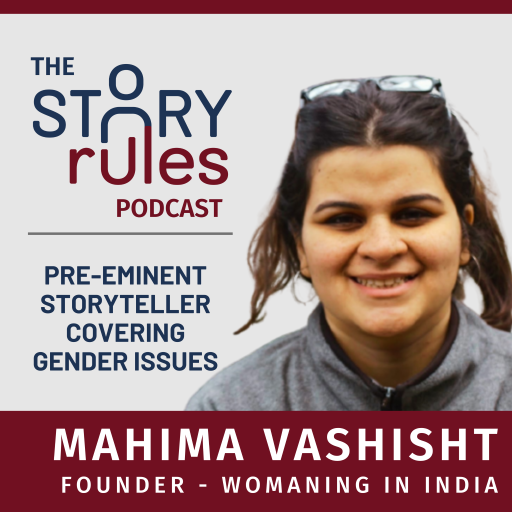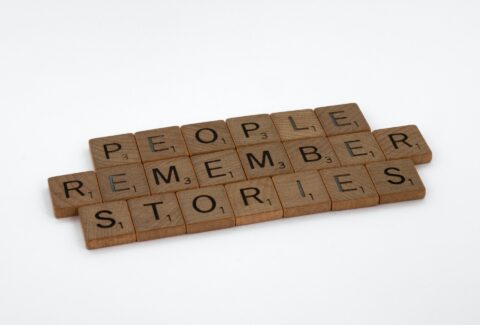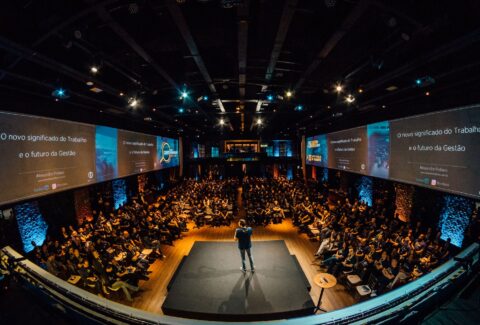E12: Mahima Vashisht, Storyteller – ‘Womaning in India’
December 4, 2021 2023-01-18 17:14E12: Mahima Vashisht, Storyteller – ‘Womaning in India’
In an old fable, two young fish are swimming in water when they pass by an older fish.
The older fish goes, “Morning, boys! How’s the water?” The younger fish just nod politely and continue to swim ahead.
But then one of them looks at the other and says, “Hey, what’s ‘water’?”
Despite swimming in it all their lives, they didn’t know that there was a name for it.
A lot of times, we are living in a state of affairs, which may not be right – but which we take for granted, because it is all around us. It’s our water.
And we need a person to stop and say, “Hey guys, what we’re all swimming in – this water – it’s not right”
Mahima Vashisht is that person.
“And their stories would suddenly be much more powerful than the story I triggered their thought with. So that’s how I started speaking to women and collecting these stories.
And the whole idea behind it, which seems to be working so far, is that you can deny opinions, you can question studies, but you cannot deny real experiences of real people.”
That is Mahima Vashisht, the incredibly talented writer of the ‘Womaning in India‘ newsletter. (You haven’t subscribed yet? Off you go and sign yourself up pronto!)
So, normally the first Saturday of the month is for my content recommendations (will be coming next week!). But this day is special. It marks the one year anniversary of Mahima’s newsletter. And so, we both decided that today would be most appropriate to launch our podcast conversation.
In my podcast, all my guests have taught me a lot about the craft of storytelling.
But it’s rare to come across a guest who – apart from storytelling – has also taught me how to be a better person.
Mahima Vashisht is one such guest.
I was introduced to Mahima’s writing through Anustup Nayak on Twitter. And I was quite blown away by her work.
In the ‘Womaning in India’ newsletter, Mahima shares stories about everyday issues faced by women. Issues like discrimination at the workplace, mental load at home, unequal sharing of domestic chores, under-representation at leadership levels across fields…and so on. And while these stories are backed by research and stats, Mahima’s main tool is her collection of stories.
Real stories shared by real people. Stories that are told with honesty, engagement, empathy, relatability… and generous amounts of humour. (One of Mahima’s superpowers is her ability to take crappy 1990s Bollywood movie references and extract comedy gold from them!)
So, two things that make Mahima a special storyteller for me:
1. Her choice of topic: Mahima writes about gender issues – a topic that impacts all of us, but has limited options in terms of engaging storytelling for those who want to know more. For the world to become a better place, a more equitable place, it is critical that these stories are shared widely, especially with men.
2. Her approach in sharing them: There’s a lot to learn from Mahima’s storytelling process. She takes incidents shared by her network of friends and adds her narrative abilities and her own brand of humour to convert these into highly readable stories.
In addition to her take on the craft of storytelling, Mahima also offers some perspective on the gender rights movement and why, despite all the gloom, there’s reason to be optimistic for the future.
It’s a must-listen conversation – especially for men!
As always, I’m sharing some some lightly-edited extracts from the conversation – tagged under ‘the 3Ps’ – the Personal, Philosophical and the Practical (all emphasis mine):
1. Personal:
a. Honesty – a childlike ability to see everything in clear black and white
I was curious to know the source of Mahima’s ability to ‘spot the water’ around us.
Ravi: “You mentioned that you’ve had a strong sense of justice since you were young. Was there somebody in the family or a role model who instilled that? Was it something that you read? How did that come about when you were young?”
Mahima: “That’s a good question. I’m not very sure, but I think it was a mixture of many things. One is that, just as a middle-class kid, you learn to value things more. My parents have not had it easy in life. They’ve had to work very hard for where they reached in life. And they worked even harder to get us to reach an even higher level; every parent wants their kid to do better than them. They’re both very deeply conscientious people. They’re very honest. And those were values that we learned, even if you’re not told, “Hey, you should be honest.” It’s more that kids pick up from what you do, rather than what you say. So as kids, I think we pick those values up from them. And when you pick up honesty as a value, you pick it up so deeply because kids are hardcore, right? Kids are not hypocrites. When kids pick up a value, they stick with it and they feel it to the core. They see everything with that lens without fear or favour. They don’t have biases to colour their viewpoint. If I have picked up honesty as a deep core value, then I want honesty in everything. So, when I see dishonesty or hypocrisy, (it goes against that core value), like “Oh, okay. You should not go out after dark. This is a rule. Okay, understood. But hey, how is this rule not being applied to this guy, but it’s being applied to this girl?” As a kid, you are very brutal in this honesty, and I think that’s where it came from, probably.”
Ravi: “That’s a great point. Yeah, I think as adults, we start seeing the world in shades of grey, right? We learn nuance. We learn “Nahi, yaha pe theek hai, yaha pe nahi.” (“yeah, it works here but maybe not here…”); we try and play with the boundaries of honesty. But as you rightly say, for a kid, it’s black and white. It’s either this or that. That’s a very interesting point.”
2. The Philosophical:
a. Why Stories – Making research studies more accessible and memorable
There’s a succinct definition of a good story. It’s by Harry McCann (of McCann Erickson) and it goes: A good story is ‘Truth, well told“.
Mahima believes that there’s a lot of ‘Truth‘ out there in the domain of gender issues. Research studies, papers, statistics, well-argued opinion pieces etc. But that ain’t moving the needle much!
I believe what she does is to bring in the ‘Well told‘ part of the equation.
Mahima: “Now, how do I write about it? That’s where the storytelling aspect comes in. When we were talking, again, before we started recording, you told me about how you have been working on converting data and information and insights into stories. That was the insight that I also had. There are all these brilliant research studies done about gender, they’re well researched, they’re published, they are spoken about for a while and then they’re forgotten. Well, it’s a disservice to say that they are forgotten, but for laypeople like me, these are not things that stay with us a lot… And that’s where I decided that I should convert all of this data and these insights which people don’t register into stories, because stories are real. For people, at least as human beings, we connect far more to stories than to data, and definitely more so than opinions. I could write a blog post about how the mental load of running the house is all on women and it’s a problem, here are 10 researches done about it, and this is my opinion on it. And then there would be another person who would write another opinion piece, arguing for the opposite side. So, whose opinion is correct? That really changes no one’s mind. That’s where I thought that opinions won’t work. The data is already there. I’m not the person to add more to these high-level, well-done research (studies) by senior professors, organizations, or institutes. Where I can come in, is to convert all of this data and opinions into stories.”
Amen to that.
b. The realisation of how stories work better when making an argument
Mahima reflects back on how she realised that stories go down easier…
Ravi: “Was there an incident or a moment in your life when you realized the power of stories as a medium?”
Mahima: “There are many, actually. Again, this has been a lifelong learning. But yes, I’ve been called by more than one person, ‘The Argumentative Indian’, and I’ve been told to go read that book. I tried and I couldn’t, to be honest. It’s very heavy! But yeah, arguing has been a very core part of my personality from the very beginning, questioning things or doing things (differently), and it’s not always a great quality for a girl to have in our society, of course. But then again, as you question things, you also learn to refine the way you argue, because you see that when I said things this way it worked, but when I said things that way, it didn’t work. Or, so-and-so presented my point using these words, and they worked better, they landed better. Subconsciously, I think I would notice these subtle differences. And through these differences, it became more and more apparent that when you give people an example of something, it lands much better than just the theory of it would have. That’s why you will see that I have almost never used words like ‘patriarchy’, ‘misogyny’, or any of the ‘-ism’s ever. I’ve been writing almost for a year now, (and I never used them), because these words are loaded. I know what they mean to me, but I don’t know what they mean to you. Because they’re big words and everyone has sort of come to their own conclusions of what these words mean. ‘Feminism’, for example. For someone it might simply mean equality; for someone it might mean justice; for someone it might mean hating men. If I say I’m a feminist, it’s taken very differently by different people. But if I say that girls in colleges should not be trapped in girls’ hostels, that they should be allowed to have the same access to the same facilities as boys, then that’s a very defined opinion. And people can understand that equally. That transfers better, right? Because it’s an example; it’s a story of what happened to me. There’s a story behind it. And I remember another thing: I was watching this documentary on Netflix about Bill Gates, and he spoke about how he understands statistics, but Melinda understands stories. He said, for example, if you say that X million number of kids die every year of malaria in the world, and it’s a highly preventable disease, he said that he understands that problem. But when they travelled to Africa, Melinda met a mother who had lost her child, and that really was the thing that moved her incredibly, and it was almost a defining moment in the setting up of the Bill and Melinda Gates Foundation, which is doing such incredible work around the world. So those are the kinds of small incidents or things that I have heard and watched which made this penny drop over time. It didn’t drop (suddenly) one day but over time, it made the penny drop: that stories are far more powerful than data. Which is unfortunate, because a million kids dying is far worse than one kid dying, but when you meet the mother of that one kid, as human beings, it leaves a much more lasting impression on us than the statistic.”
c. Honesty and simplicity in writing
When we start off writing, we tend to use fancy, ‘important-sounding’ words… which is not a very good thing for the reader!
Mahima: “(When) I used to write as a kid, in school and college magazines, and then in college I became a little more of a “fancy writer”. I would try really hard to find cool references, or you know, try to build some Pink Floyd lyrics into my writing, and all that. That’s what the cool kids around us were doing. You try to ape that a little. For me, my mother tongue is Hindi, so I grew up thinking in Hindi. Although I always studied in English medium schools and I was fairly good at English, but these turns of phrases and clever writing would not come to me very organically. So when I would read it, I would be so impressed and bowled over. And in those early years, I would try to ape it and try to write like the cool people wrote.
But what I realized over the years is that that was not honest, because that’s not how I think, that’s not how I talk. And I’m trying to build an additional layer of ‘fake-ness’ with the so-called coolness, which is actually fake, which I was building around my writing. So over the years, I’ve tried to unlearn that, in the last decade or so, which is that I tried to write how I talk, and how I would tell this to a friend is how I’m trying to write it. That’s why the piece speaks to people, I think.
Because if I try to make it cool and use turns of phrases, and puns, and alliterations, and bring in some rock music lyrics of a song that I think makes me appear as cool, it’s going to become so hard for the reader to decode, that they’re going to give up on it. Like you said, many writers are not doing it. I think that that is the trouble that I find as a reader. I find that really great writing, like The New Yorker, or New York Times, (this sort of) writing which is called amazing and given awards the world over, I often find that (writing) hard to access, because that’s not how I think or I talk. And I find that when someone writes in the way that I think and talk, it makes it much easier. The reading becomes as easy as listening.”
3. The Practical
a. Story Triggering – to get your team to share stories, you need to start with one first
Here’s the thing. All of us have gone through innumerable experiences, innumerable stories in our life.
But if someone asks us, hey can you tell me a story of an incident when you, say, struggled with managing a diverse team… our minds go blank.
How do you extract the stories hidden inside people’s memories?
You trigger them by sharing one of your own.
Mahima: “There are research studies done on how the mental load is being taken disproportionately by women, I went out and I spoke to 10, 20 women, and asked them, “Is this true in your life?” In many cases, even the women were not aware of it because again, they are swimming in the water. We are not aware of the water. My water is darker and more polluted than your water, but neither of us are aware of it. In many cases, I had to give them examples from my own life, or other stories I’d heard, and then they would say, ‘Oh, yeah, this has happened in my life.'”
Ravi: “You trigger their stories, brilliant.”
Mahima: “Yeah, I would give them an example of what I mean by mental load, and then the penny would drop and then suddenly they would come up with 10 times more stories. And their stories would suddenly be much more powerful than the story I triggered their thought with. So that’s how I started speaking to women and collecting these stories.”
b. Read and consume content from the ‘side which is not often heard’
Ravi: (What advice) would give to the young Mahimas and Mihirs out there, who maybe want to also write and share these stories? What kind of content to consume…?
Mahima: As a youngster, (when) you’re trying to learn to be more intersectional about any aspect: whether you’re trying to be more aware of gender, or about caste, or about race, ethnicity, religion, anything, I think it’s useful to read and consume content that’s coming from the side which is not often heard. For example, in my case, a few years ago, I started and now I almost exclusively read fiction by women authors. I realized just a few years back, as recent as that, that this has been a blind spot for me. Almost all the fiction that I grew up reading has been written by men. The moment I switched to women authors, I saw a whole different perspective that they bring to their books.
If you really want to understand how gender works, read more women authors. If you really want to understand more about the queer world, read more queer authors. So on and so forth. Stretch that to every other aspect as well. Basically, if you want to talk more or learn more about a particular disadvantaged section of society, you should look more closely at the art made by the people from that section.
And those were some highlights from the conversation with Mahima Vashisht, an extraordinary storyteller covering gender issues with so much passion, skill and humour.
A few things which stayed with me:
– The importance of raw honesty and authenticity in sharing your stories
– How stories work better than facts and opinions when you are trying to convince someone to unseat deeply held beliefs
– The use of humour – Because sometimes you need the see the funny side of things to cope with how dire reality can be.
You can enjoy my conversation with Mahima at your favourite podcast location:
Browser
Podcast apps: Apple Podcasts | Spotify | Google Podcasts | Stitcher | Podcast Addict | Pocket Casts
Happy listening!
If you find the content valuable, please rate and review this podcast on iTunes, Spotify, Google Podcasts, or wherever you listen to them (links above). It’ll help others like you discover these insights!
This podcast was hosted by me, Ravishankar Iyer. Audio editing by Kartik Rajan. Transcript editing by Amisha Jha and all-round support by Sanket Aalegaonkar.
Thanks,
Ravi








